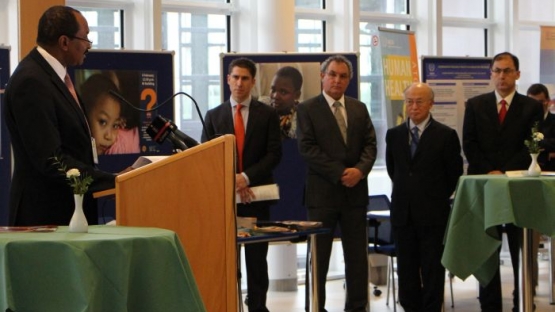The Ambassador of Sudan, H.E. Mr Mahmoud Hassan El Amin, has expressed his appreciation for the work of the IAEA's technical cooperation (TC) programme during celebrations to mark World Cancer Day on 4 February 2013. The Ambassador, speaking at the annual event organized by the IAEA's Programme of Action for Cancer Therapy (PACT) at the IAEA's headquarters in Vienna, praised the impact of the TC programme in increasing national human resource capacities in radiotherapy and other related areas in Sudan, as well as the significant contribution the programme has made to Sudan's efforts to expand and consolidate its medical infrastructure for cancer care.
Over the past 10 years, 150 specialists in Sudan have been trained through the TC programme, including radiation medicine physicist, radiopharmacists, nuclear medicine physicians, radiation oncologists, medical physicists, radiotherapy technicians and equipment maintenance technicians. This human resource capacity building has helped to improve Sudan's ability to respond to the increasing needs of its cancer patients. Numerous IAEA fellowships have been provided to medical doctors and other essential staff working in oncology in Sudan, with the aim of improving national abilities to provide specialized treatment to cancer patients in the country. TC fellows from Sudan have attended specialist training programmes in radiation oncology and other radiology fields in some of the leading cancer institutions around the world. Many have been trained in the neighbouring country Egypt, as well as in India, South Africa, Turkey and the UK.
The TC programme is also helping Sudan to establish two new medical centres. Under an on-going national TC project to supporting the development of a cancer management network, the IAEA has facilitated the services of an architect specializing in the design of medical centres and radiation oncology facilities, who has delivered a ground plan for the two centres in accordance with radiation safety requirements. Both centres are expected to cater for patients living in the remote areas in Shandi and Merowethe, where access to cancer care has been very limited up to this point.
In addition, Sudan has received IAEA technical cooperation for cancer control through a number of regional projects. Such projects take into consideration existing capacities and different operational conditions within the region. Many regional projects are carried out within the framework of the African Regional Cooperative Agreement (AFRA), a mechanism to transfer scientific and technical know-how within the region through workshops, training courses, seminars and symposiums.
With the help of the TC programme, cancer treatment is now more accessible to many patients in Sudan. Underlining his appreciation for on-going IAEA activities in Sudan, Ambassador El Amin concluded his speech by looking forward to more engagement and cooperation with the IAEA. Currently, a new national TC project has been submitted for the upcoming TC cycle to further address the country's efforts in cancer control.


